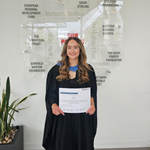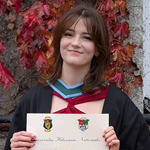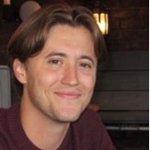Published: 17 Oct 2025
Category:
By Sofia Rossi, Lilly Tosh, Rhiannon Pettitt, Minh Dang & Ralph Greenwood




Spotlighting the recipients of the 2024 Vacation Studentship
The encourages undergraduates to take pharmacology as a specialty. Winners receive up to £1,850 for up to ten weeks to help cover living costs during a summer research project, which they have organised with their supervisor.
In 2024, we awarded 10 studentships, covering a range of topics. Five of our recipients have shared reports of their experiences.
Sofia Rossi
Upon completing my BSc (Hons) in Biomedical Science at the University of Southampton, I had the opportunity to undertake a ten-week research project.
I reached out to Dr John Parrington at the University of Oxford to explore opportunities for an internship in his lab in February 2024. I was thrilled to discover a summer project that aligned perfectly with my interests and provided the chance to enhance my skills in cutting-edge laboratory techniques at such a prestigious institution. In May 2024, I was delighted to receive the news from the British Pharmacological Society of being granted a Vacation Studentship. This esteemed award financially supported me throughout my stay in the lab, enabling me to fully immerse myself in the invaluable experience.
The original objective of my project was to culture melanoma cell lines B16 and CHL1 WT and two-pore channel 2 (TPC2) knockouts for testing a new TPC2 agonist (SG-094) for safety, toxicity and off-target effects through various assays. However, I encountered significant challenges in maintaining sterile technique, precise pipetting, and proper thawing procedures. I initially struggled with making mistakes and worked at a slower pace to prevent them from recurring. Nonetheless, through consistent practice, I was able to enhance my skills and build my confidence over time.
Overall, the experience I engaged in proved to be a multifaceted success. It afforded me the valuable opportunity to integrate into the vibrant and international research community at Oxford. This opportunity also enhanced my capacity to work independently, design and reshape experimental plans upon unexpected outcomes, as well as refine my technical expertise. Moreover, the limited yield of significant results allowed me to improve my skills in troubleshooting laboratory challenges at various stages.
Consequently, I now stand as a more versatile and well-prepared researcher, equipped to tackle the array of research challenges throughout my future career.
Read Sofia's reflection
Lily Tosh
During the summer between my third and fourth year undergraduate MSci Pharmacology course at the University of Strathclyde, I was incredibly lucky to complete an internship under the supervision of one of my lecturers, Prof. Robin Plevin, and his PhD student, Kirsty Tinto. This was made entirely possible by the BPS Vacation Scholarship award, for which I am extremely grateful.
I was heavily involved with the planning of my project, where I was able to pitch my ideas to both Robin and Kirsty. This level of involvement continued throughout my project and has allowed me to improve my planning skills as well as undoubtedly boosting my self-confidence. Additionally, this experience has given me a realistic insight into the day-to-day tasks completed in the laboratory. Initially, I was introduced to aseptic technique and cell culture. By week 8, I was completely independent when completing cell culture tasks. I then had the opportunity to use these cells for several techniques, including immunofluorescence, Western blotting, SiRNA and even some RT-qPCR.
Completing biological replicates using these techniques has allowed me to become increasingly confident in the lab as well as allowing me to become more independent and expand my practical skillset. This has helped prepare me for my 4th year project next semester, as well as any research opportunities in my future career.
Read Lilly's reflection
Rhiannon Pettitt
Rapid-acting antidepressants (RAADs) are a new class of treatments for major depressive disorder (MDD) that show both rapid and sustained effects following a single dose. Both serotonergic psychedelics (5HT2A agonists) and non-competitive NMDA antagonists show potential as RAADs, in vitro, in vivo and ex vivo, however, the mechanisms by which they work are unconfirmed. Understanding the underlying mechanisms would enable the design of novel RAADs with less potential for abuse so this is a key focus of current research for pharmaceutical companies.
The main hypotheses surrounding RAAD mechanisms of action are increased glutamatergic signalling causing increased brain connectivity, decreased serotonergic signalling, and induced neuroplasticity such as neurogenesis, synaptogenesis and dendritogenesis which would explain the sustained effects of RAADs.
Many of the experiments published are at higher doses than those which are clinically relevant and are not administered systemically. This leads to questions of how translatable these studies are to the clinically demonstrated antidepressant effect. Furthermore, much of the research has not focussed on the neural circuit and therefore has neglected key brain regions underpinning negative affective biases – a key characteristic of MDD.
Therefore, the experiment was designed to compare the neuronal activation in brain regions associated with affective biases and sensorimotor processing between clinically relevant doses, high doses used in the literature and a vehicle (saline).
I would like to thank the British Pharmacological Society, Professor Emma Robinson and the PhD candidates Dasha Anderson and Siyu Chen from the School of Physiology, Pharmacology and Neuroscience at the University of Bristol, for the opportunity to engage in academic research this summer. Alongside providing the opportunity to learn new techniques and immersing me in academic culture, it has confirmed my interest in pursuing research in neuropharmacology following the completion of my degree.
Read Rhiannon's reflection
Minh Dang
My 8-week internship involved investigating the biophysical properties of engineered tandem-repeat proteins containing grafted NRF2 loops to modulate the NRF2/KEAP1 pathway in cancer. This opportunity allowed me to gain hands-on experience with biophysical techniques that I had only learned about through textbooks, such as circular dichroism and fluorescence competitive assays. I also enhanced my molecular biology skills by repeatedly performing techniques that I had not had the chance to practise extensively during my course. Additionally, the experience broadened my understanding of different pharmacological approaches, such as modulating protein-protein interactions. Through several trials, errors, and failed experiments, I gained confidence in the lab and learned to troubleshoot unexpected problems independently. The supportive, collaborative, and motivated environment fostered my curiosity and helped me learn how to ask and answer questions in fields I was not yet familiar with.
Read Minh's reflection
Ralph Greenwood
Instead of taking a placement year, I decided to gain lab experience through summer placements, so I was thrilled when I was awarded the BPS Vacation Studentship under the supervision of Dr Pritchard.
We decided to base the 8-week project on the cause of incontinence in Alzheimer’s Disease patients, which has long been thought to be due to impaired cognition leading to a loss of bladder control. It was my job to try and disprove this theory. Initially, I found the range of lab techniques difficult to get my head around, but fortunately my supervisor and the rest of my lab colleagues were very helpful and patient.
This vacation studentship has improved my confidence and technical skills, whilst also providing me with that crucial laboratory experience that is crucial for getting a job in research or applying for PhDs. Separately from the academic value, this experience also allowed me to make new friends and was a really enjoyable 8 weeks.
Read Ralph's reflection
Robyn Gaffey
In the summer of 2024, I completed a BPS-funded summer research project under the supervision of Prof. Eilis Dowd on the topic: “Harnessing Biomaterials for Brain Repair in Parkinson’s Disease”. I was first introduced to Prof. Dowd as my lecturer for a Neuropharmacology module and was fascinated by both the topic and her personal research in this area. Prof. Dowd’s current research focuses on improving viability and maturation of transplanted stem cell-derived neuronal precursors. To achieve this, her team tests different biomaterials to determine their effects on the survival, maturation and overall efficacy of the grafts in 6-OHDA-lesioned rats. The particular study I was involved in examined the use of neurotrophin-loaded cryogel spheres to deliver neurotrophic factors BDNF and GDNF to the transplant site. During my project I was under the supervision of Prof. Dowd’s PhD students Tommy Patton, Saoirse Ryan and Sarah Crudden.
The main assay I performed was an immunohistochemical assay, staining rat brain slices for GDNF. After staining I fixed the tissue on slides and used a microscope to examine them and capture images, which I later analysed for optical density of GDNF. Doing this study allowed me an understanding of the day-to-day work that goes on in a neuroscience lab, and how in vivo experiments are completed from start to finish. Ultimately I was able to present the data I gathered during this project at the Galway Neuroscience Centre Research Day in December 2024, which was a really valuable experience for me.
I also had the opportunity to gain experience in other techniques, namely culture of SH-SY5Y cells and Western blot analysis of the same. I assisted a PhD student in the lab with optimising his Western blot protocol for analysing levels of alpha-synuclein in cells. This experience gave me a unique insight into the trial-and-error that is such an important part of scientific research. Through performing multiple Western blots, we were able to troubleshoot the protocol and optimise an experimental design for future studies.
This project greatly benefitted me as a developing researcher, and I am pleased to be able to say I am now a PhD student in Prof. Dowd’s lab, owing in part to BPS for allowing me the opportunity to gain research experience here.
Read Robyn's reflection
.
The encourages undergraduates to take pharmacology as a specialty. Winners receive up to £1,850 for up to ten weeks to help cover living costs during a summer research project, which they have organised with their supervisor.
Comments
If you are a British Pharmacological Society member, please
sign in to post comments.